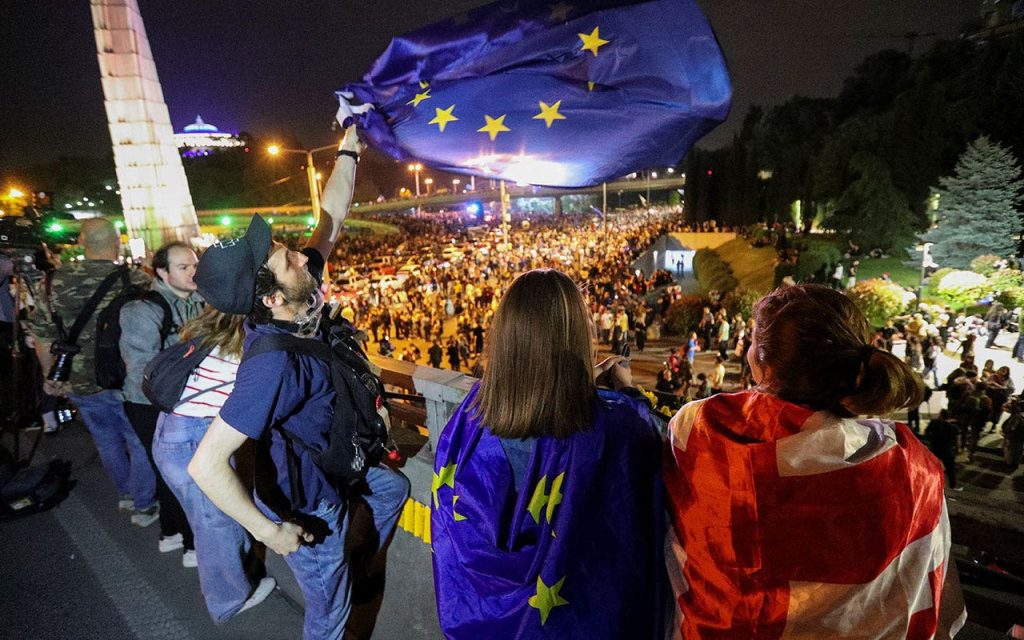The Georgian prime minister has rejected U.S. criticism of a proposed “foreign agents” law, deeming it false and reminiscent of past meddling that fuelled violence. The draft legislation would require organizations with more than 20% foreign funding to register as agents of foreign influence, a move opposers view as authoritarian and inspired by Kremlin. Protests have erupted in Tbilisi against the law, with the EU and U.S. advising Tbilisi to drop the legislation to avoid hindering its chances of EU membership and a broader Euro-Atlantic future. The confrontation is part of a broader struggle determining whether Georgia aligns closer with Europe or back under Moscow’s influence.
Prime Minister Irakli Kobakhidze criticized the U.S. State Department for their false statements regarding the transparency bill and street protests, drawing comparisons to similar past incidents involving the U.S. Ambassador. He emphasized the need for a fair and honest approach to restart relations between Georgia and the United States, without the interference of misinformation. Bidzina Ivanishvili, founder of the ruling Georgian Dream party, vowed to fight for Georgia’s sovereignty while accusing the West of meddling and attempting to drag the country into conflict.
As the draft law progresses through the Georgian parliament, it has sparked ongoing protests in Tbilisi against the mandatory registration of organizations with significant foreign funding as agents of foreign influence. The European Union and the United States have warned Tbilisi of the potential negative consequences of enacting the law, which could harm its prospects of joining the EU and maintaining a Euro-Atlantic future. The standoff reflects a critical decision for Georgia, a country that has experienced conflict and revolution since the Soviet Union’s collapse, in determining its alignment towards Europe or potential influence from Moscow.
The proposed “foreign agents” law in Georgia has led to a growing divide between the government and opposition protesters, who view the legislation as a means of exerting authoritarian control inspired by the Kremlin. The U.S. criticism of the law has been rejected by Prime Minister Kobakhidze, citing past instances of false statements and interference that have incited violence and revolutionary processes. Bidzina Ivanishvili’s stance on defending Georgian sovereignty against Western interference adds another layer of complexity to the ongoing struggle over the country’s future alignment.
The confrontation over the “foreign agents” law in Georgia has highlighted the broader geopolitical implications at stake, with the outcome potentially shaping the country’s relationship with Europe and Russia. The protests in Tbilisi and the international concern voiced by the EU and U.S. underscore the significance of the legislation in determining Georgia’s path forward. The conflicting narratives between the government and opposition, as well as accusations of foreign meddling, further complicate the resolution of the standoff and the potential impact on Georgia’s geopolitical trajectory.
The situation surrounding the proposed “foreign agents” law in Georgia reflects a critical juncture in the country’s political landscape, with implications for its relationship with Europe and potential influence from Moscow. The ongoing protests in Tbilisi and the international scrutiny of the legislation illustrate the high stakes involved in the decision-making process. The rejection of U.S. criticism by Prime Minister Kobakhidze and accusations of foreign interference suggest a complex web of geopolitical tensions at play in determining Georgia’s future alignment and sovereignty. Bidzina Ivanishvili’s assertion of defending Georgia’s sovereignty against perceived Western meddling further adds to the complexity of the situation and underscores the challenging path ahead for the country.


